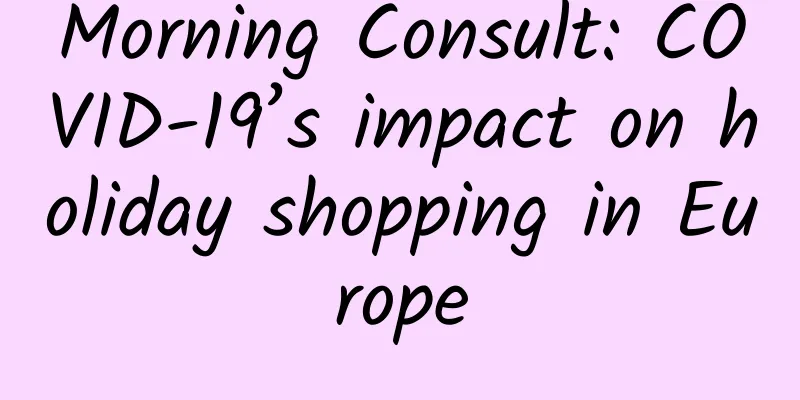Morning Consult: COVID-19’s impact on holiday shopping in Europe

|
The epidemic is becoming increasingly severe across the European continent, and some European countries are preparing for a "dark winter." New research conducted between October 15 and 17 among 1,000 adults in each of the UK, Spain, France, Italy, Germany and Poland aims to shed light on ongoing concerns about the coronavirus. With anxiety heightened due to recent lockdowns, the sense of nostalgia, joy or relief that the holidays may bring will drive conversions for brands in key European markets this quarter. COVID-19 will have a major impact on the 2020 holiday season for 71% of European consumers and their families. However, only 43% of Germans think so. 67% of Europeans think COVID-19 will have a major impact on their holiday shopping decisions this year, with Germans being the exception (only 41% think so). If and how will it be celebrated? A large majority of Europeans acknowledged that there will be fewer holiday gatherings this year than in previous years and that their traditions and ways of celebrating the holidays will also change because of the pandemic, although these sentiments are weaker in France, Germany and Poland. The Spanish and French, as well as many in the UK, are more likely to cancel their usual holiday gatherings altogether this year. In the months leading up to the holidays, more than half of Spanish, French and Polish people worry about their job security, while Germans are significantly less worried (28%). Whether and how to consume During this holiday season, an average of two-thirds of Europeans plan to spend less, compare prices, and buy fewer holiday gifts. In addition, financial distress and concerns caused by the economic downturn will translate into different holiday shopping behaviors in the European market:
Where will you shop? While UK consumers are more likely to do the majority of their holiday shopping online this year (49%), with Poles relying primarily on in-store shopping (47%), other EU markets are less clear-cut. Gifts purchased and given European markets and the UK are split on whether gifts will be sent to loved ones but not in person: most Spanish, French and Polish consumers plan to send gifts in person, but more Germans and British plan to send gifts by post. The PDF version will be shared on 199IT Knowledge Planet, just scan the QR code below! |
>>: Cross-border procurement report: Five factors affecting the global clothing procurement pattern
Recommend
Dolphin: What just got into my head?
Dolphins are very intelligent and highly social a...
The efficacy and function of the plant
Do you know about the Maiboshu? It is a common me...
Be careful! If hot pot chili oil gets into your eyes, ophthalmologists will share their emergency response tips!
In Chongqing, winter is the peak season for eatin...
The barren saline-alkali land has actually changed the "appearance" of the coastline?
Saline-alkali land refers to land with excessivel...
The efficacy and function of Platycladus orientalis leaves
Platycladus orientalis leaves are a traditional C...
What are the differences between honeysuckle and mountain honeysuckle?
Speaking of honeysuckle, I believe many people kn...
High temperatures beyond the limit of survival have already occurred, but this is just the beginning
Summer is becoming increasingly unbearable. Since...
Can Maca really enhance sexual performance?
Men all hope that their sexual abilities are reco...
If you are losing weight, please keep this good news
Audit expert: Wu Xi Deputy Chief Physician, Depar...
Interview with Professor Yu Wenqiang | Birth, aging, illness and death are not only related to human genes, but epigenetic regulation also affects our health
Introduction: As the saying goes, "One mothe...
Is ChatGPT's core technology going to be replaced?
Techniques comparable to reinforcement learning w...
What are the effects of white peony root
White peony root is a very common Chinese patent ...
The difference between Codonopsis and Astragalus
There are many common medicinal herbs in life. Di...
Not everyone can have laser surgery for myopia!
Reviewer of this article: Xu Qibin, associate chi...
What are the effects and functions of raw ginkgo and how to eat it?
Ginkgo nuts, also known as gingko nut, are the fr...









